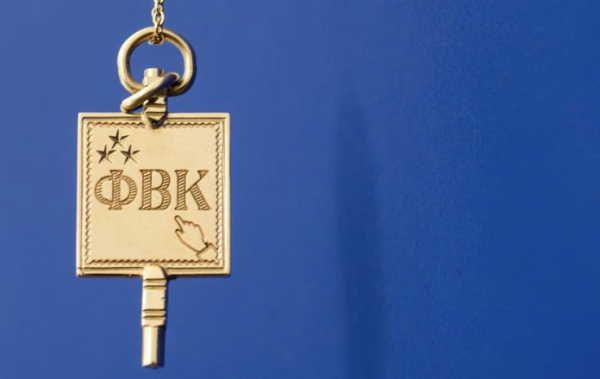
Phi Beta Kappa, Hamilton’s academic honorary society, celebrates distinguished seniors across all fields of study in the liberal arts. These students have demonstrated academic excellence and strong moral character over the course of their four years at Hamilton, as recognized by the faculty members of Phi Beta Kappa. Their exceptionalism has earned them a place among the chapter of this old tradition, which traces its founding all the way back two centuries to 1776.
Five undergraduates at the College of William and Mary spearheaded the Phi Beta Kappa society. However, Phi Beta Kappa was originally a secret society called Societas Philosophiae, the “Society of Philosophy.” The founders created a motto for their society, Philosophiae Biou Kubernetes, (“Wisdom, the helmsman or guide of life”) abbreviated Phi Beta Kappa. Phi Beta Kappa’s Greek name distinguishes itself from other literary societies which generally have Latin names.
In the 1800s, Phi Beta Kappa transitioned from a secret society for discussing philosophical dilemmas to its current status as an honorary academic society. Many other universities began opening their own chapters of Phi Beta Kappa, and Hamilton’s “Epsilon Chapter of New York” opened in 1869, making it the 20th founded overall. Over the years, many famous politicians including Theodore Roosevelt, George H. W. Bush and John Quincy Adams have been members of Phi Beta Kappa.
This year, 29 members of Hamilton’s class of 2025 were distinguished as new members of Phi Beta Kappa. The Hamilton Chapter elected ten members in the Fall: Henry Boehm, Rebecca Dalphin, Sabina Feder, Luke Hayes, Carina Jones, Brian Wang, Rongchen Wang, Katherine Withers, Kathryn Woodruff and Chenyue Yang. The chapter reconvened this spring to elect 19 additional members: Lane Barsh, Georgia Brown, Megan Case, Deanna Durben, Alexandra Ennis, Jennifer Gidicsin, Connor Grand, Charles Haberstock, Peter Jones, Thomas Kantrowitz, Akay Kaya, Eve Karmozyn, Dasomie Kim, Ainsley Novack, Alyssa Samuels, Carter Segal, Claire Williams, Lecen Zhang and Ziyi Zhou.
Mathematics and Sociology Major Ennis commented she is “super honored to be elected to Phi Beta Kappa because the chance to engage with various departments at Hamilton and really delve into the liberal arts has meant so much to [her] over the past four years.” She asserted that she is “beyond grateful to the professors and peers who have defined this experience.”
Brown, who is majoring in psychology, reflected on what this honor means to her: “It is a great example of Hamilton’s promise to study what you love. In my time at Hamilton, I wasn’t trying to check off each of the six categories that Phi Beta Kappa recognizes (in fact, I actually didn’t even realize I had); rather, I was just taking classes I was excited about. It means the passion and hard work I’ve put in has been recognized and that feels really good.” Brown was exemplary of Phi Beta Kappa’s appreciation of genuine intellectual curiosity, in addition to strong academic performance. Reflecting on her most memorable academic experiences, Brown raved about Associate Professor of Psychology amd Director of Jurisprudence, Law and Justice Studies Keelah William’s course on friendship: “She’s such an engaging lecturer and it was probably the class at Hamilton that felt the most relatable and applicable to my life. I also took it with two of my good friends so it was cool to learn more about our friendships together.”
Akay Kaya, a History and Economics double major, shared that “Being recognized for the breadth of courses taken and for academic achievement suggests to me that I took full advantage of the opportunities Hamilton has had to offer over these past few years.”
For him, the honor signifies his commitment to embracing Hamilton’s liberal arts promise.
Hamilton’s newly-elected Phi Beta Kappa students represent the college’s values of intellectual curiosity, academic excellence and strong moral character. The diversity of courses at Hamilton have served as the gateway for electees to explore their interests and nurture their academic talent. Kaya reflected on one of his most memorable academic experiences in the notoriously difficult economics course, Econometrics: “It was almost certainly my first econometrics exam. I feel badly for Professor Arstham Cross, who I bothered immensely during the days leading up to it. Office hours felt like I was interrogating him. I think I spent more time in KJ than I did in my dorm that week. It was all well worth it, though.”
While strong academic performance is one of the requisites for gaining admission to Phi Beta Kappa, GPA is not the only metric Phi Beta Kappa considers when determining electees. Phi Beta Kappa considers students’ level of engagement with a wide array of disciplines. The new class of 2025 Phi Beta Kappa represents a cohort of hardworking, dynamic and morally disciplined students who challenged themselves, worked hard and ultimately distinguished themselves through this great honor.

























